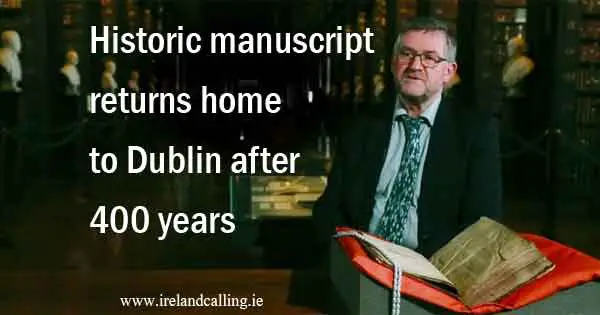A historic manuscript from the 14th century has been acquired by Trinity College Dublin and has now been returned to Ireland.
The medieval text was produced at St Mary’s Abbey in Dublin and contains a vast array of historical records from Ireland prior to the 14th century.
St Mary’s Abbey was a regular meeting place for the religious and political leaders in Ireland. The manuscript includes accounts of the Trojan War, the conquest of Ireland and numerous legal texts from the era.

It also contains works from Giraldus Cambrensis (Gerald of Wales), one of the most prominent chroniclers of the early 13th century.
The manuscript was lost to private owners in the 16th century, after Henry VIII made the Church of England the dominant religion in Ireland.
It re-surfaced in the 18th century when it was purchased by British politician the first Earl Somers.
The manuscript was put on sale at Christie’s auctioneers in London in November 2014, and Trinity College Dublin brought it back to its home city.
The college’s historians are rightly excited to have secured its return to Dublin. Librarian and College Archivist Helen Shenton explained: “This is a major acquisition. It’s significant because it’s going to enable new research and scholarship and investigation in lots of different ways. It will enable a re-assessment of some of the history of Dublin because St Mary’s Abbey was in Dublin and we can look into the civic history in Dublin in the 14th and 15th century and the cultural history.”
Bernard Meehan, the Keeper of the Manuscripts at Trinity, added: “So few manuscripts have survived from medieval Ireland. There was enormous destruction of the monastic manuscripts in the Elizabethan Age in particular and when a manuscript like this comes up for sale it’s a very, very remarkable event.”
RTÉ visited the university to speak to the excited historians about their acquisition of the manuscript. Watch their report below.